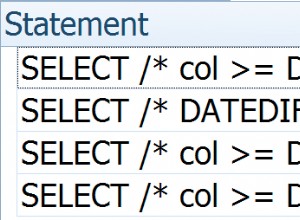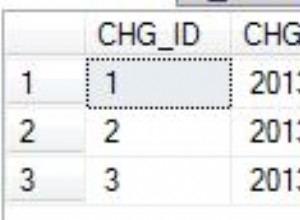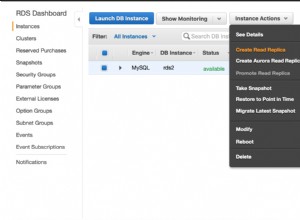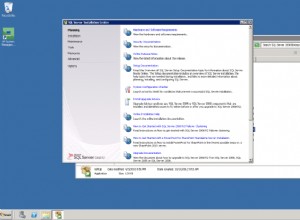J'ai fini par rouler le mien. A également réalisé que l'ENTIER 126 bits d'Oracle n'est pas assez de bits pour les adresses 128 bits d'IPv6. Franchement, je ne sais pas comment INET6_ATON (ou INET_PTON) de la bibliothèque C d'origine le fait, étant donné que je n'ai jamais entendu parler d'un entier de 16 octets.
Je me suis retrouvé avec une chaîne hexadécimale de 32 octets, ce qui signifie que je dois faire des calculs sophistiqués "demi-chaîne" sur nettohex et utiliser SUBSTR pour que les FBI fonctionnent correctement. (Blasted PL/SQL n'autorise pas "RETURN CHAR(32)"...)
Dans l'ensemble, cependant, cela fonctionne bien, fonctionne dans tous les formats et permet des comparaisons de caractères basées sur l'index pour savoir si une adresse IP se trouve dans une plage IP.
Voici le code complet :
CREATE OR REPLACE FUNCTION ipguess(
ip_string IN VARCHAR2
) RETURN NATURAL
DETERMINISTIC
IS
BEGIN
-- Short-circuit the most popular, and also catch the special case of IPv4 addresses in IPv6
IF REGEXP_LIKE(ip_string, '\d{1,3}(\.\d{1,3}){3}') THEN RETURN 4;
ELSIF REGEXP_LIKE(ip_string, '[[:xdigit:]]{0,4}(\:[[:xdigit:]]{0,4}){0,7}') THEN RETURN 6;
ELSE RETURN NULL;
END IF;
END ipguess;
CREATE OR REPLACE FUNCTION iptohex(
ip_string IN VARCHAR2
) RETURN CHAR -- INTEGER only holds 126 binary digits, IPv6 has 128
DETERMINISTIC
IS
iptype NATURAL := ipguess(ip_string);
ip VARCHAR2(32);
ipwork VARCHAR2(64);
d INTEGER;
q VARCHAR2(3);
BEGIN
IF iptype = 4 THEN
-- Sanity check
ipwork := REGEXP_SUBSTR(ip_string, '\d{1,3}(\.\d{1,3}){3}');
IF ipwork IS NULL THEN RETURN NULL; END IF;
-- Starting prefix
-- NOTE: 2^48 - 2^32 = 281470681743360 = ::ffff:0.0.0.0
-- (for compatibility with IPv4 addresses in IPv6)
ip := '00000000000000000000ffff';
-- Parse the input
WHILE LENGTH(ipwork) IS NOT NULL
LOOP
d := INSTR(ipwork, '.'); -- find the dot
IF d > 0 THEN -- isolate the decimal octet
q := SUBSTR(ipwork, 1, d - 1);
ipwork := SUBSTR(ipwork, d + 1);
ELSE
q := ipwork;
ipwork := '';
END IF;
-- convert to a hex string
ip := ip || TO_CHAR(TO_NUMBER(q), 'FM0x');
END LOOP;
ELSIF iptype = 6 THEN
-- Short-circuit "::" = 0
IF ip_string = '::' THEN RETURN LPAD('0', 32, '0'); END IF;
-- Sanity check
ipwork := REGEXP_SUBSTR(ip_string, '[[:xdigit:]]{0,4}(\:[[:xdigit:]]{0,4}){0,7}');
IF ipwork IS NULL THEN RETURN NULL; END IF;
-- Replace leading zeros
-- (add a bunch to all of the pairs, then remove only the required ones)
ipwork := REGEXP_REPLACE(ipwork, '(^|\:)([[:xdigit:]]{1,4})', '\1000\2');
ipwork := REGEXP_REPLACE(ipwork, '(^|\:)0+([[:xdigit:]]{4})', '\1\2');
-- Groups of zeroes
-- (total length should be 32+Z, so the gap would be the zeroes)
ipwork := REPLACE(ipwork, '::', 'Z');
ipwork := REPLACE(ipwork, ':');
ipwork := REPLACE(ipwork, 'Z', LPAD('0', 33 - LENGTH(ipwork), '0'));
ip := LOWER(ipwork);
ELSE
RETURN NULL;
END IF;
RETURN ip;
END iptohex;
CREATE OR REPLACE FUNCTION nettohex(
ip_string IN VARCHAR2,
cidr IN NATURALN,
is_end IN SIGNTYPE DEFAULT 0
) RETURN CHAR
DETERMINISTIC
IS
iptype NATURAL := ipguess(ip_string);
iphex CHAR(32) := iptohex(ip_string);
iphalf1 CHAR(16) := SUBSTR(iphex, 1, 16);
iphalf2 CHAR(16) := SUBSTR(iphex, 17);
ipwork CHAR(16) := iphalf2;
cidr_exp INTEGER := 2 ** (iptype + 1) - cidr;
ipint INTEGER;
subnet INTEGER;
is_big SIGNTYPE := 0;
BEGIN
-- Sanity checks
IF iptype IS NULL THEN RETURN NULL;
ELSIF iphex IS NULL THEN RETURN NULL;
END IF;
IF cidr_exp >= 64 THEN is_big := 1;
ELSIF cidr_exp = 0 THEN RETURN iphex; -- the exact IP, such as /32 on IPv4
ELSIF cidr_exp < 0 THEN RETURN NULL;
ELSIF cidr_exp > 128 THEN RETURN NULL;
END IF;
-- Change some variables around if we are working with the first/largest half
IF is_big = 1 THEN
ipwork := iphalf1;
iphalf2 := TO_CHAR((2 ** 64 - 1) * is_end, 'FM0xxxxxxxxxxxxxxx'); -- either all 0 or all F
cidr_exp := cidr_exp - 64;
END IF;
-- Normalize IP to divisions of CIDR
subnet := 2 ** cidr_exp;
ipint := TO_NUMBER(ipwork, 'FM0xxxxxxxxxxxxxxx');
-- if is_end = 1 then add one net range (then subtract one IP) to get the ending range
ipwork := TO_CHAR(FLOOR(ipint / subnet + is_end) * subnet - is_end, 'FM0xxxxxxxxxxxxxxx');
-- Re-integrate
IF is_big = 0 THEN iphalf2 := ipwork;
ELSE iphalf1 := ipwork;
END IF;
RETURN SUBSTR(iphalf1 || iphalf2, 1, 32);
END nettohex;
-- WHERE clause:
-- 1. BETWEEN compare:
-- iptohex(a.ip_addy) BETWEEN nettohex(b.net_addy, b.cidr, 0) AND nettohex(b.net_addy, b.cidr, 1)
--
-- Requires three function-based indexes, but all of them would work, as they are all inside the tables.
--
-- 2. CIDR match:
-- nettohex(a.ip_addy, b.cidr) = nettohex(b.net_addy, b.cidr)
--
-- Only two functions and uses exact match, but first one requires an outside variable. Last one would be only function-based index.
-- An FBI of iptohex(a.ip_addy) could be implemented, but it's questionable if nettohex would use that index.
--
-- Recommended FBIs:
--
-- (SUBSTR(iptohex(a.ip_addy), 1, 32))
-- (SUBSTR(nettohex(b.ip_addy, b.cidr, 0), 1, 32), SUBSTR(nettohex(b.ip_addy, b.cidr, 1), 1, 32))
--
-- NOTE: Will need to use the SUBSTR form for the above WHERE clauses!
MISE À JOUR : Oracle 11g permet de placer l'entrée SUBSTR dans une colonne virtuelle. Ainsi, vous pourriez avoir des colonnes comme celle-ci :
ip VARCHAR2(39),
cidr NUMBER(2),
ip_hex AS (SUBSTR(iptohex(ip), 1, 32)) VIRTUAL,
ip_nethex_start AS (SUBSTR(nettohex(ip, cidr, 0), 1, 32)) VIRTUAL,
ip_nethex_end AS (SUBSTR(nettohex(ip, cidr, 1), 1, 32)) VIRTUAL,
Et des index comme :
CREATE INDEX foobar_iphex_idx ON foobar (ip_hex);
CREATE INDEX foobar_ipnet_idx ON foobar (ip_nethex_start, ip_nethex_end);
Utiliser des clauses WHERE comme :
a.ip_hex BETWEEN b.ip_nethex_start AND b.ip_nethex_end
nettohex(a.ip, b.cidr) = b.ip_nethex_start -- not as effective




